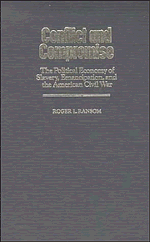5 - The Politics of Compromise
Published online by Cambridge University Press: 05 June 2012
Summary
A gigantic fraud has been committed in the name of slavery, which has aroused a keen sense of wrong, and filled the dullest understandings with apprehensions for our future liberties. The Kansas–Nebraska bill – which repealed the Missouri Compromise, sprung like a trap, as it was, upon a Congress not chosen in reference to it; hurried through the forms of legislation, under whip and spur, by a temporary majority; alleging a falsehood in its very terms, and having the seizure of a vast province, secured to freedom by thirty years of plighted faith, as its motive – was the fatal signal which, after astounding the nation by its audacity, rallied it to battle.
Parke Godwin, 1856The demise of the Whig party following the presidential election of 1852 created an enormous vacuum in the American political scene. For two decades, Whigs and Democrats had vied for the presidency, each with some degree of success. Now there was only one truly national party: the Democrats. But even that solidarity was illusory. No party could maintain any consistent degree of unity in the face of the slave issue. In the early 1850s no politician could avoid taking some stand on the question of slavery and the territories. The situation created by the Compromise of 1850 allowed three broad stances that politicians could offer the voters when asked about slavery and the West.
- Type
- Chapter
- Information
- Conflict and CompromiseThe Political Economy of Slavery, Emancipation and the American Civil War, pp. 121 - 171Publisher: Cambridge University PressPrint publication year: 1989



